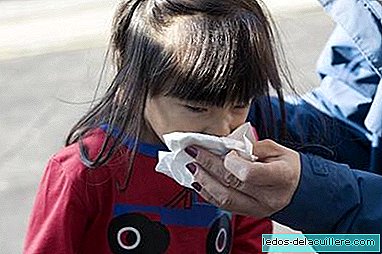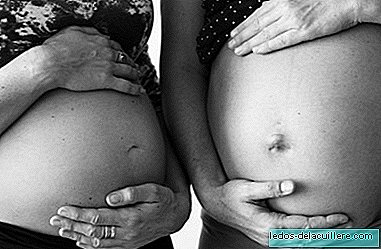
After reviewing the electoral proposals for the families of the two main parties (let's not fool ourselves, we all know why the polls that one of them will govern us for the next four years) clearly say so, we will focus on the proposals for the families of the United Left-Los Verdes program.
It is clear that these points are a minimum part of the electoral programs, which shows that it is other areas that interest politicians and society in general. It is also true that I do not believe that anyone decides their vote only for proposals focused on families (although I do not criticize that this is done), because also in these times the economy and other social and environmental policies (especially in IU-Los Verdes) They deserve preferential attention.
It is not easy to make an extract and systematization of the broad programs to bring the contents that interest us in the blog, but in this case we have distinguished the following sections: Education, Children, Sexual and reproductive rights, Equality and birth permits and Economic measures that would help work and family conciliation, a topic that tiptoed in the electoral debate.
These are IU's electoral proposals for families Looking ahead to the next 20N elections:
Education
Quality public education must be a political priority because it contributes to social cohesion and the formation of more equal, freer and more critical people. IU reiterates its commitment to defend quality public and secular education and we defend that public education is an investment, not an expense.
Expansion of the network of publicly owned and managed nursery schools to cover all the demand for schooling from 0 to 6 years, especially in the 0 to 3 year cycle. Modification of current regulations on Early Childhood Education to establish requirements and a basic curriculum that guarantee the unity and educational nature of the entire stage. Free books and classroom teaching materials to make effective the free basic education, through libraries, reuse and loan resource centers. Promote curricular, methodological and organizational changes that allow responding to the diversity of students, especially those who have more difficulties, and that benefit students as a whole, contributing to the realization of everyone's right to learn successfully. Inclusion of a specific subject on equality between men and women, as a measure of prevention of gender violence, in the curricula of initial and permanent training of teachers and other professionals related to education (social work, social education, mediation intercultural, etc.). Ensure that all educational centers respect the affective-sexual diversity, promoting a sexual education that exceeds the current heterosexist contents and offering all LGTBfobia prevention programs to all professionals and AMPAS. Actions that boost and develop the habit of sport in children, adolescents and young people with the aim that the greatest number of young people regularly practice one or more sports, with specific measures for those who complete compulsory education for children. 16 years. The school-age sport, in schools outside school hours, must be connected with the Educational Project of the school where it takes place. For the United Left, boys and girls are citizens, just like adults. Their state of development, their age cannot be the excuse for not taking them seriously. Therefore we propose: Approve an Organic Law of comprehensive measures to combat violence against children, which addresses the different forms of violence and establishes coordinated measures of action to prevent and detect it in the social, health, educational and judicial fields, ensuring the prompt and adequate attention of the victims. Increase the percentage of public spending for families and children, reaching at least the European average of 2.3%. Approve an Action Plan against child poverty and for the well-being of children with quantifiable objectives, compliance indicators, budgetary allocation and coordination mechanisms among public administrations. Reform Organic Law 1/1996, on the legal protection of minors, and the framework legislation relating to the child protection system, to establish common minimum standards for intervention by public administrations and ensure maximum judicial control of decisions affecting The fundamental rights of children. Extend the duration of maternity and paternity leave, as a measure to promote work and family reconciliation and foster positive parentality. Expressly prohibit in the Civil Code physical and humiliating punishment as a method to educate or correct children. Create the figure of the Ombudsman for Children within the Ombudsman Institution and reinforce the functions of research and systematic data collection of the Childhood Observatory in order to obtain an annual "radiography" of the situation of children in Spain. Review judicial and administrative procedures to guarantee the right of the child to be heard and promote children's participation. Include childhood as a horizontal priority in the next Master Plan for Spanish cooperation, maintaining the commitment to the Millennium Development Goals and the commitment to reach 0.7% of GDP for official development aid. Sexual and reproductive rights guarantee the free decision on how to live one's body. They include the free decision of women to practice sexuality without sexist stereotypes and without the social coercion that necessarily determines motherhood. These are the rights that women have to share our lives sexually without predetermined or imposed moral or religious determinations. We also consider that heterosexism, as the prevailing social construction, remains the predominant form of sexual relations that we do not share. Not only because of what gender inequality means, since heterosexual imposition is still a form of oppression against women, but because we defend people's loving, emotional and sexual relationships, regardless of their biological sex. Support for family diversity. The actions of the State Administration in childhood and family will contemplate family diversity and guarantee the rights of minors, fathers and mothers. Modification of the Law of Assisted Reproduction to allow the cession of ovules within the marriages between two women. Recognition of the right to adoption and joint affiliation of de facto couples of the same sex by matching them to de facto couples of different sex. Inclusion in the catalog of Social Security benefits of the coverage of assisted reproduction processes for couples of women and single women. Guarantee of the correct application of the instruction that regulates the filiation of children born by surrogacy during the terms determined by it. Recognition of the right to enjoy paternity and maternity leave for marriages formed by men. Policies that advance domestic co-responsibility and incorporate reproductive work in the GDP calculation, which is mostly carried out by women, and which would account for 25% of their total computation. We defend that the establishment of birth and / or adoption permits for each non-transferable parent should not be delayed for another moment, which should progressively reach an equal duration. For this, the necessary transitional measures must be articulated to increase the permission of the parents (or the 'other parent') until they reach equality with that of the mothers. The urgent modification of the Workers' Statute and the Basic Statute of the Public Employee is necessary, in order to standardize full co-responsibility in the upbringing and care of daughters and sons. Finally, it should be added that among the economic measures to overcome the crisis, IU proposes measures that would benefit the work and family conciliation: I think who else who least has already decided their vote (or their non-vote), but not too many people access the electoral programs of those parties that will vote or not vote. That is why bringing these proposals closer to our readers, proposals related to the topics that interest us most in Babies and more, drawn from extensive programs that are sometimes quite indigestible, can be interesting (and comfortable) for many readers. And if it serves to show who we agree with or who does not, discover something of the "hidden program" (because we did not know it or we had not stopped to think about its importance) because welcome are these compilations of electoral proposals of political parties for families. Proposals that, I am sure, and as happens in all areas of the program, will only be partially fulfilled, whoever wins.Inclusion in the educational curriculum, both transversely and specifically, of relevant content on education in affective-sexual diversity, diversity of family models, values of respect and tolerance, etc. Specific and permanent training of teachers to work on affective-sexual and gender diversity in the education system, in collaboration with LGTBI associations.
Childhood
Sexual and reproductive rights
Equality and birth permits
Economic measures that would help conciliation
Reduction of working hours to 35 hours per week without a decrease in monthly salary. Control and limitation of overtime. Streamlining work schedules.
Encourage the incorporation of women into the active salaried population with the development of a battery of measures that favor this entry and that help in the creation of employment (universalization and gratuitousness of public nursery schools; extension of maternity / paternity leave; real reconciliation of family life with work ...).












